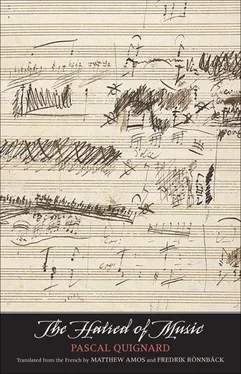In the countryside it happens that I once again with pleasure, for a moment, play this ancient, exceptional, convocative, dispossessing, fascinating thing that used to be called “music.”

Music since the Second World War has become an undesirable sound, a noise to use an old word from our language. 1

Even the reservoirs of silence that places of prayer in the Western world constituted, particularly Christian churches and cathedrals of the Catholic rite, have been equipped with soundtracks that aim to welcome the visitor and to help him avoid the dread of silence as well as, more paradoxically, save him from the eventuality of prayer.

Hesychius of Batos said: “Prayer is reflection that comes to a halt.”
The desert monk further wrote: “Prayer is a motionless wild beast surrounded by dogs.”
Finally, Hesychius said: “Prayer is death that keeps watch in its silence.”

The desert ascetics called “singing with the drum and the harp” the act of superposing the respiratory rhythm onto the heartbeat during the litanic pronunciation of the secret name of Jesus ( Ichtys ). To justify the incessant use of litanies, they said: “Beyond meaning is the body of the verb.”
Beyond what is semantic resides the body of language: this is the definition of music.

Maximus the Confessor wrote: “Prayer is the door through which the verb passes, is laid bare and is forgotten.”

When music was rare, its convocation was as overwhelming as its seduction was vertiginous. When the convocation is incessant, music becomes repulsive, and it is silence that hails and becomes solemn.
Silence has become the modern vertigo. In the same way that it constitutes an exceptional luxury in megacities.
The first to have sensed this was Webern — killed by an American detonation.
Music that sacrifices itself now attracts silence as the birdcall attracts the bird.

What does it mean to disenchant?
To shield from the power of song. To wrest the enchanted from malefic obedience. To exorcise the evil spirit, the evil that is the stain of death. The choice that presents itself to the shaman is simple: either he makes the body unbearable to the spirits that have made it their abode and that have made it sick. Or he lures them out.
To disenchant is to do evil to evil. It makes the spirit come out. To enchant it elsewhere, fixate it on something else.

In the eighteenth century, Antoine Galland always uses enchanted for depressed . Depression is an evil spell — be it cast by Kirkè the Sparrowhawk or by the Sirens. Nervous depression is still in his eyes an enchantment that needs to be “disenchanted.”

Man is no longer subject to a physical obedience to the sounds of nature. He has suddenly subjected himself to a social obedience to electrified nostalgic European melodies.

The ancient Chinese were justified in saying: “The music of an era reveals the state of the State.”

To release our societies from the spell of their obedience. The taste for order and for subjugation in our societies has turned into hysteria. The cruelest wars are ahead of us. They will be the ever more gruesome compensation, the sacrificial payment for social, medical, legal, moral, and police protection in times of peace.

Endlessly multiplied music and paintings reproduced in books, magazines, postcards, films, CD-ROMs, have been torn away from their uniqueness. Having been torn from their uniqueness, they have been torn from their reality. In this process, they have shed their reality. Multiplication has removed them from their appearance. Removing them from their appearance, it has removed them from original fascination, from beauty.
These ancient arts have become dazzling mirrored scintillations, a whisper of echoes without a source.
Copies — and not magical instruments, fetishes, temples, caves, islands.
King Louis XIV listened only once to the works that Couperin and Charpentier offered to his attention in his chapel or in his bedroom. The following day, other works were ready to resound for the first and last time.
Since the king appreciated written music, he sometimes asked to hear twice a work that he had particularly appreciated. The court would be surprised by this request and would comment on it. Memorialists would bring it up as a curiosity in their books.

The occasion of music, for millennia, was as singular, untransportable, exceptional, solemn, ritualized as could be a gathering of masks, an underground cave, a sanctuary, a princely or royal palace, a funeral, a wedding.

High fidelity meant the end of written art music. We listen to the material fidelity of the reproduction, and no longer to the stunning sounds of the world of death. An excessive simulation of reality has supplanted the real sound that develops in, and is swallowed by, the real air. The conditions of a concert or of a live performance increasingly shock the audience whose erudition has become as technological as it is obsessive.
Hearing the acoustic. Hearing what we control, whose volume we can raise or lower, what we can interrupt, or whose omnipotence we can unleash at our pleasure.
Contrary to the habits of our times, François Couperin said that he used, for want of anything better (for want of having brought back the magical instrument from the land of the dead, that is, from the land where the sun sets, that is, from the farthest point, from the farthest lingua of the earth where all that is visible fades), the harpsichord. He maintained that he heard the music while writing it beyond the sounds that the instrument could produce in space.
He believed that all instruments were essentially inapt, besides merely incomplete.

In the ancient world, the statue of Memnon, in pink quartzite, despite being broken, continued to let its song be heard at sunrise. All the Greeks and all the Romans would cross the sea to hear the stone god that the inhabitants of Egypt worshiped. Septimius Severus had it repaired. It never again emitted its song.

The duration of shellac microgrooves (three minutes) imposed on modern music its exhausting brevity.

Music’s pretense to audio-analgesia, de-subjugating it from written predation, has returned it to hypnosis.
Читать дальше













